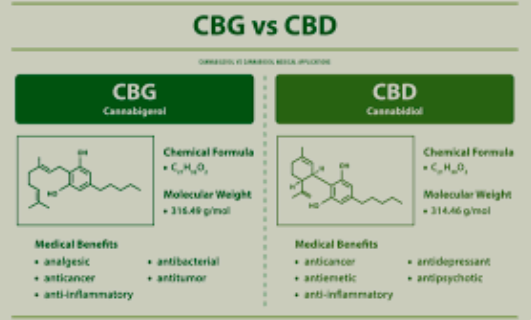When it comes to cannabinoids, CBG and CBD are two that often come up in conversations about health and wellness. Both offer unique benefits and uses, but they are distinct compounds with their own properties. Let’s dive into the world of CBG vs CBD and break down what makes each one special.
What Is CBG?
Understanding CBG
Cannabigerol, or CBG, is a non-psychoactive cannabinoid found in cannabis plants. Often referred to as the “mother of all cannabinoids,” CBG is a precursor to other cannabinoids like THC and CBD. As the plant matures, CBG transforms into these compounds through various enzymatic processes.
How CBG Works
CBG interacts with the endocannabinoid system (ECS), which helps regulate various bodily functions such as mood, appetite, and sleep. Unlike THC, CBG does not produce a high, making it a popular choice for those looking for therapeutic benefits without psychoactive effects.
What Is CBD?
Understanding CBD
Cannabidiol, or CBD, is another non-psychoactive cannabinoid. It’s one of the most studied and widely recognized cannabinoids, thanks to its diverse range of potential health benefits. Derived primarily from hemp, CBD is used in various products, from oils and tinctures to creams and edibles.
How CBD Works
CBD also interacts with the ECS, but its effects are often more subtle compared to THC. It’s known for its potential in reducing anxiety, improving sleep, and providing relief from chronic pain, among other benefits.
CBG vs CBD: Key Differences
**1. Chemical Structure
While both CBG and CBD share a similar molecular structure, their chemical bonds and how they interact with cannabinoid receptors differ. CBG is typically found in lower concentrations than CBD, making it less prevalent in cannabis products.
**2. Effects and Benefits
- CBG: Research suggests that CBG may offer benefits such as anti-inflammatory properties, potential neuroprotective effects, and appetite stimulation. It is also being studied for its role in managing conditions like glaucoma and inflammatory bowel disease (IBD).
- CBD: On the other hand, CBD is well-known for its anxiety-reducing properties, pain relief, and anti-seizure effects. It’s commonly used to manage conditions like chronic pain, epilepsy, and anxiety disorders.
**3. Availability
CBD is widely available and has a vast array of products on the market. CBG, while gaining popularity, is less common and often more expensive due to its lower concentration in cannabis plants and the complexity of its extraction.
Benefits of CBG
**1. Anti-Inflammatory Properties
CBG has been shown to have significant anti-inflammatory effects, which can be beneficial for conditions like arthritis and IBD. By reducing inflammation, CBG can help alleviate pain and improve overall quality of life.
**2. Neuroprotective Effects
Research indicates that CBG may offer neuroprotective benefits, which could be valuable in treating neurodegenerative diseases like Huntington’s disease. Its ability to protect nerve cells from damage is a promising area of study.
**3. Appetite Stimulation
Unlike CBD, which might suppress appetite in some users, CBG has been shown to stimulate appetite. This makes it a potential option for individuals struggling with appetite loss due to conditions like cancer or chronic illness.
Benefits of CBD
**1. Anxiety and Stress Relief
One of the most celebrated benefits of CBD is its ability to reduce anxiety and stress. Numerous studies have demonstrated its effectiveness in lowering anxiety levels and improving overall mental well-being.
**2. Pain Management
CBD is often used as a natural remedy for chronic pain. Its anti-inflammatory and analgesic properties make it an attractive option for those seeking relief from conditions like arthritis or muscle pain.
**3. Improved Sleep
Many people turn to CBD for its potential to improve sleep quality. By addressing issues like anxiety and pain, CBD can help users achieve more restful and uninterrupted sleep.
How to Choose Between CBG and CBD
**1. Consider Your Needs
When deciding between CBG and CBD, it’s important to consider your specific needs. If you’re looking for general wellness support or relief from anxiety and pain, CBD might be the better choice. For targeted benefits like appetite stimulation or neuroprotection, CBG could be more suitable.
**2. Product Availability
CBD products are more readily available, making them easier to find and incorporate into your routine. CBG, being less common, might require a bit more effort to source and could be pricier.
**3. Consult with a Healthcare Professional
As with any supplement or therapeutic option, consulting with a healthcare professional is crucial. They can provide personalized advice based on your health needs and conditions.
Conclusion
In the debate of CBG vs CBD, both cannabinoids offer unique benefits and potential uses. CBG stands out for its anti-inflammatory, neuroprotective, and appetite-stimulating properties, while CBD is renowned for its anxiety relief, pain management, and sleep improvement.
Choosing between CBG and CBD depends largely on your individual needs and health goals. Whether you’re interested in the broad-spectrum benefits of CBD or the specific advantages of CBG, both cannabinoids have a place in the evolving world of natural health remedies.



